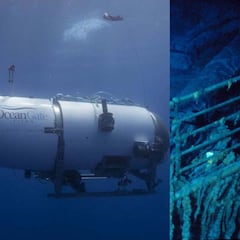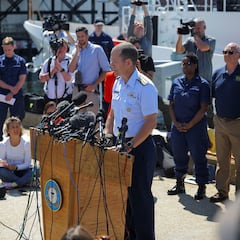Will OceanGate face criminal charges after the ‘catastrophic implosion’ of the Titan submersible?
OceanGate has reported the loss of the five crew members of the Titan submersible after a “catastrophic implosion”. Will the company face criminal charges?

After several days of uncertainty, the United States Coast Guard on Thursday announced the discovery of various debris near the Titanic that belonged to OceanGate’s Titan submersible.
“The debris field is consistent with a catastrophic implosion of the vessel,” the USCG said, meaning it would have been a rapid implosion with no chance of survival. The Coast Guard said the implosion occurred after a loss of pressure in Titan’s chamber. Subsequently, Titan operator OceanGate announced that the five crew members are presumed dead.
“This is an extremely sad time for our dedicated employees who are exhausted and grieving deeply over this loss,” reads part of the company statement.
— OceanGate Expeditions (@OceanGateExped) June 22, 2023
Among the crew were British businessman Hamish Harding, Pakistani businessman Shahzada Dawood and his son Suleman Dawood, French explorer Paul-Henry Nargeolet and Stockton Rush, CEO and co-founder of OceanGate. After their deaths, could the company face criminal charges?
Will OceanGate face criminal charges after the ‘catastrophic implosion’ of the Titan submersible?
Questions continue to arise about the disappearance of Titan and if OceanGate Expeditions, the company that owns the submersible, can be held criminally responsible for the deaths of the crew.
David Pogue, a former passenger on the sub, told People that before the dive he was required to sign a waiver. According to Pogue, this is “pretty clear about all the ways you could be permanently disabled, emotionally traumatized or killed. The waiver states: ‘This ship has not been inspected or certified by any government agency,’” said Pogue.
However, according to trial attorney and former federal prosecutor Neama Rahmani, such a waiver does not protect OceanGate from all types of criminal action in light of the passenger's deaths.
Will OceanGate Face Criminal Charges After 'Titan' Sub's 'Catastrophic' Implosion? Legal Expert Weighs In https://t.co/C0IyZDDzob
— People (@people) June 22, 2023
“You can only waive simple negligence. By law, you cannot waive gross negligence. So this is above and beyond… You can waive the known risks, but you can’t waive anything more than that,” he told People.
Related stories
“If the company knows this is dangerous, they’re ignoring warnings, they’re not participating in security protocols or reviews, that kind of thing that’s industry standard... If they are not participating in what is the industry standard or custom, that is evidence that can be presented in any lawsuit, whether civil or criminal, of criminal negligence or recklessness,” he added.
However, Rahmani says that it is difficult to determine what kind of charges the company could face at this time. One thing that could possibly make criminal charges a bit more difficult is the fact that OceanGate CEO Stockton Rush is among the passengers who died after the submersible imploded.


